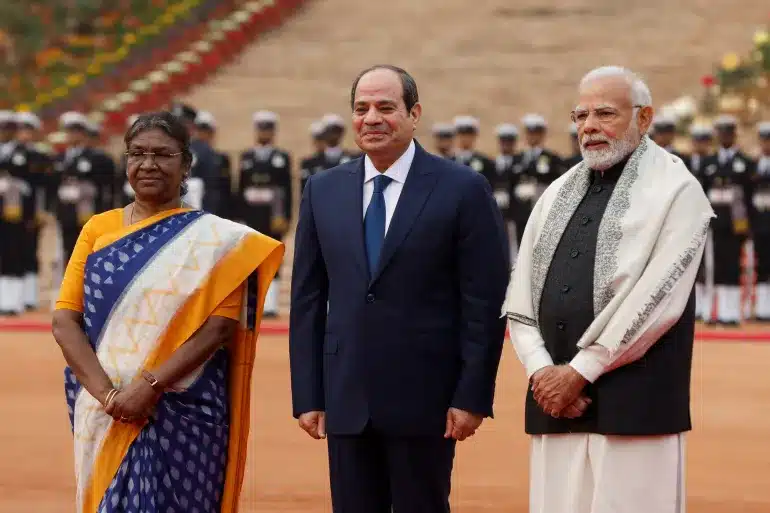In the intricate dance of geopolitics, Egypt finds itself delicately poised between the gravitational pulls of Western and Eastern superpowers. Its strategic location, historical ties, and economic dependencies make it a pivotal player in the global arena. Yet, as the tides of international relations ebb and flow, Egypt faces the challenge of balancing its alliances, safeguarding its security, and satisfying the needs of its populace.
At the heart of Egypt’s diplomatic calculus lies its dependency on Russian wheat. As the world’s largest importer of this strategic commodity, Egypt’s reliance on Russian and Ukrainian wheat underscores its vulnerability to shifts in global dynamics. The conflict in Ukraine served as a stark reminder of the fragility of Egypt’s food security. With traditional suppliers facing turmoil, Cairo turned to Moscow and other nations to secure its wheat needs. This dependency not only highlights Egypt’s susceptibility to external forces but also underscores the intricate web of interdependence that characterizes modern geopolitics.
Simultaneously, Egypt navigates the treacherous waters of American security ties. Historically, Egypt has been a key ally of the United States in the Middle East, receiving significant military aid and assistance. However, the dynamics of this relationship have been marked by periods of tension and divergence, particularly in the aftermath of political upheavals such as the Arab Spring. The ousting of President Mohamed Morsi and the subsequent crackdown on dissent strained relations between Cairo and Washington, prompting Egypt to explore alternative alliances.
Enter Russia – a longstanding player in Egypt’s political calculus. President Abdel Fattah el-Sisi’s overtures towards Moscow reflect Cairo’s strategic realignment in response to shifting global dynamics. The inauguration of the El Dabaa nuclear power plant, financed primarily by Russia, symbolizes the deepening ties between the two nations. As Egypt seeks to diversify its alliances and reduce its reliance on traditional partners, Moscow emerges as a formidable player in its quest for strategic autonomy.
The recent inclusion of Egypt in the BRICS economic bloc signifies a bold step towards economic diversification and independence. By embracing alternative frameworks outside the traditional Western-dominated order, Cairo seeks to assert its sovereignty and insulate itself from external pressures. The BRICS membership offers Egypt access to new markets, investment opportunities, and avenues for cooperation, providing a counterbalance to the hegemony of Western institutions.
Yet, Egypt’s diplomatic tightrope walk is not without its perils. The spectre of internal dissent looms large, exacerbated by economic instability and social unrest. The country’s burgeoning population, coupled with soaring inflation and unemployment rates, poses a formidable challenge to its leadership. As the gap between the haves and have-nots widens, Egypt grapples with the urgent imperative of addressing socio-economic inequalities and ensuring inclusive growth.
Moreover, Egypt’s delicate balancing act comes under scrutiny in the wake of global conflicts and crises. The Russian invasion of Ukraine sends shockwaves across the international stage, testing Cairo’s resolve and resilience. As pressure mounts from Western powers to condemn Moscow’s actions, Egypt finds itself at a crossroads, torn between loyalty to its traditional allies and the imperative of preserving its strategic interests.
In the face of mounting challenges, Egypt must chart a course that safeguards its sovereignty, enhances its security, and promotes the well-being of its citizens. A nuanced approach that balances competing interests and leverages diverse partnerships is essential to navigate the complex currents of international relations. By fostering dialogue, promoting cooperation, and pursuing policies that advance its national interests, Egypt can assert its agency on the world stage and carve out a distinct role in the evolving global order.
In conclusion, Egypt’s position as a linchpin in the geopolitical landscape underscores the complexities of contemporary diplomacy. Caught between Western and Eastern superpowers, dependent on Russian wheat, American security ties, and grappling with internal challenges, Egypt stands at a critical juncture in its history. As it seeks to navigate the turbulent waters of global politics, Egypt must forge a path that reflects its aspirations, values, and interests, ensuring a future of stability, prosperity, and dignity for its people.
Image credit: Adnan Abidi/Reuters



















